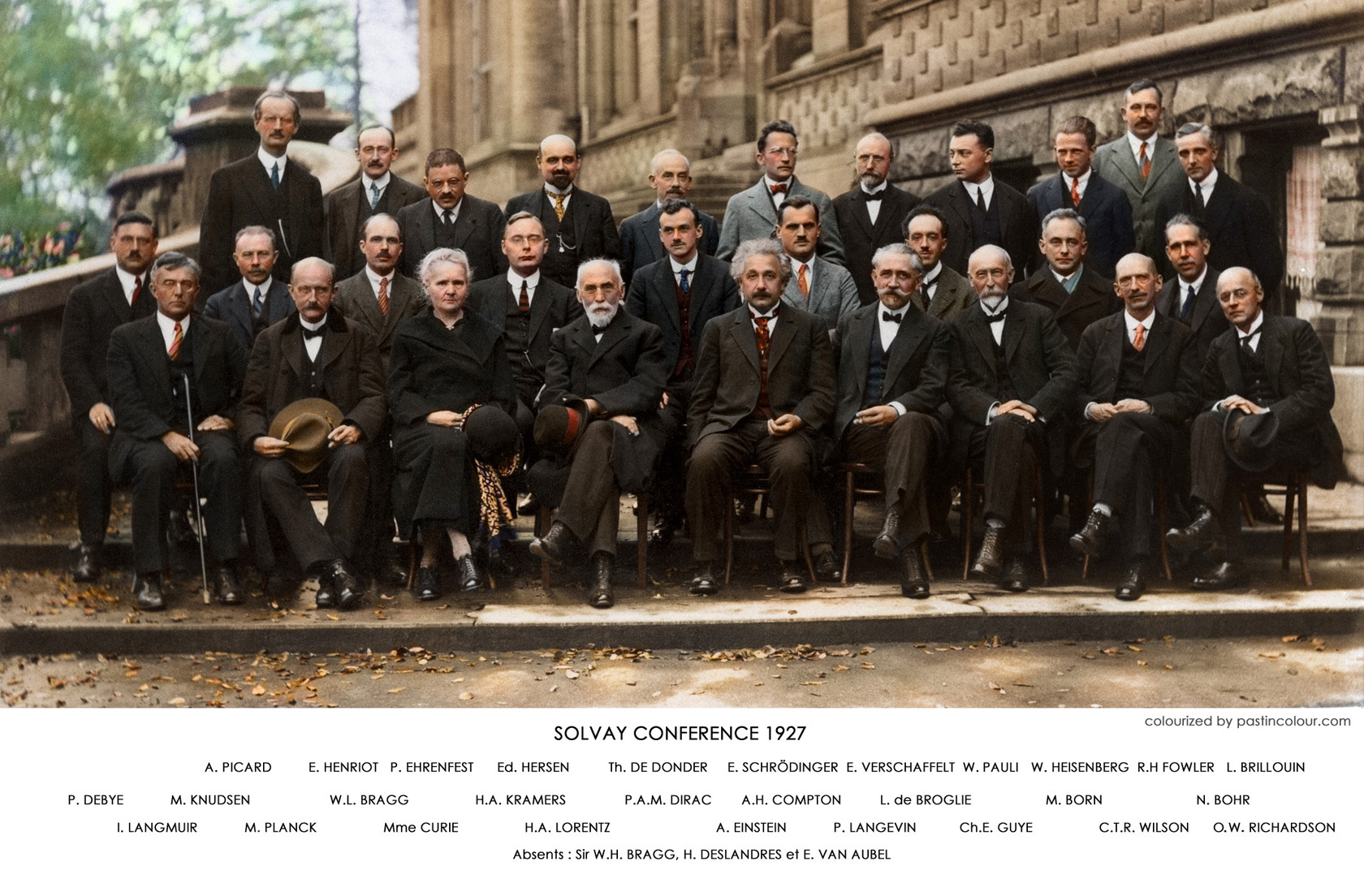PHYS-E0414 - Advanced Quantum Mechanics D, Lecture, 6.9.2022-8.12.2022
This course space end date is set to 08.12.2022 Search Courses: PHYS-E0414
Topic outline
-
 Colorized picture from the Fifth Solvay International Conference on Electrons and Photons (October 1927). During this historical conference, many aspects of the novel quantum theory were discussed and clarified (at least some aspects; others are still debated!) The picture features 17 Nobel Prize winners, including Marie Curie, who received the Nobel Prize twice.Here is a nice BBC documentary on quantum physics, which is worth watching before the course starts: The Secrets of Quantum Physics
Colorized picture from the Fifth Solvay International Conference on Electrons and Photons (October 1927). During this historical conference, many aspects of the novel quantum theory were discussed and clarified (at least some aspects; others are still debated!) The picture features 17 Nobel Prize winners, including Marie Curie, who received the Nobel Prize twice.Here is a nice BBC documentary on quantum physics, which is worth watching before the course starts: The Secrets of Quantum PhysicsCourse name:
Phys-E0414 Advanced Quantum Mechanics
Status of the course:
Optional course of the majors Engineering Physics, Physics of Advanced Materials, and Quantum Technology. Optional course of the Engineering Physics minor. Elective course in the Quantum Technology BSc degree.
Subsequent courses:
The course provides the necessary knowledge for further courses involving quantum mechanics, e.g. PHYS-E0551 Low Temperature Physics and PHYS-E0420 Many-body Quantum Mechanics.
Description:
The course is a master's-level class on advanced quantum mechanics, assuming basic knowledge of quantum physics and mathematical tools such a linear algebra and complex analysis.
We take Planck's radiation law from year 1900 as our historical starting point and then proceed through the scientific developments that eventually led to the quantum theory that we know today. We then move on to modern applications and concepts, such as the experimental detection of entanglement, quantum computing and communication, up until the current era of quantum engineering and quantum technology.
The course consists of lectures, exercise classes, and home work problems.
Content:
The following topics will be discussed:
- History and postulates of quantum mechanics
- Quantum states and wave functions, quantum measurements
- Hilbert space, Dirac notation, Hermitian operators
- Spin and angular momentum, the Bloch sphere, spin resonance
- The quantum harmonic oscillator, coherent states
- Time-independent perturbation theory, the Wentzel–Kramers–Brillouin (WKB) method
- Composite systems and entanglement
- Bell’s inequaility and the EPR paradox
- Quantum computing, Deutsch’s algorithm, Grover’s algorithm
- Quantum teleportation and communication
- Open quantum systems and decoherence
Intended learning outcomes:
After the course, a student can:
- Explain the fundamental postulates of quantum mechanics
- Solve quantum mechanical problems using mathematical tools such as the Dirac notation and the representation of physical observables by Hermitian operators
- Predict the time-evolution of a quantum system and the probabilities of specific measurement outcomes
- Develop approximate solutions to stationary problems using perturbation theory (or the WKB method)
- Analyse composite quantum systems and entanglement
- Describe basic algorithms for quantum information processing and quantum communication
- Account for decoherence processes in open quantum systems
Course structure and workload:
The course takes place during Period 1 & 2 and consists of
- 12 x 1.5 h lectures (Tuesdays) = 18 h
- 12 x 1.5 h exercise classes (Thursdays) = 18 h
- 12 x 4.0 h home work problems = 48 h
- 12 x 4.0 h reviewing teaching material = 48 h
- Exam = 3 h
Course material:
We will be using the text book "Quantum Mechanics: Concept and Applications" by N. Zettili together with hand-written lecture notes and supplemental material. (Recorded lectures from 2020 are available for those who are interested.)
Course level:
The course is aimed at master's-level students, who are familiar with basic quantum mechanics (e.g. PHYS-C0210 or any other introductory course on quantum mechanics), linear algebra, and some complex analysis.
Evaluation:
The final grade (1-5) is based on home work exercises (40%) and a written exam (60%).
Credits:
5 ECTS points
